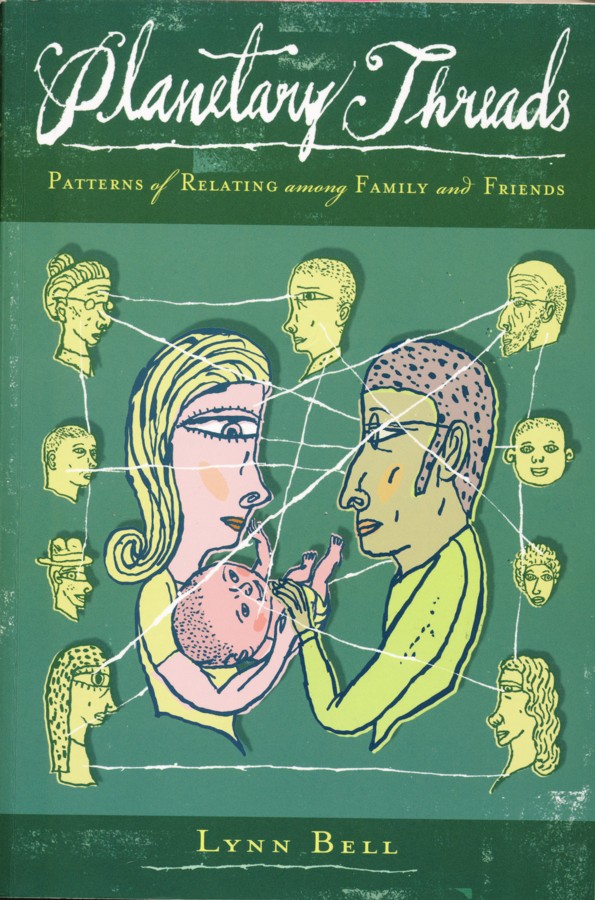
This is a revised edition of a book published by the Centre for Psychological Astrology (CPA) Press in Britain in 1999. Bell is an American who has lived in Paris since 1978 and began teaching for the CPA in 1995. The CPA faculty is the best of the best, and a heavy-weight credential for a writer to sling around.
Nevertheless, I approached this book with trepidation, having read a few too many psychological astrology books that seemed to have too much chocolatey psycho-center and not enough actual astrology. Psychologists like to pimp their favorite theory of the month. Yawn.
Lynn Bell's treatment of the topics sneaked past my reservations. I became totally engrossed in the discussions presented in the book, and did a lot of deep thinking to boot! “Planetary Threads” is about relationships with siblings and friends. The introduction (pp 3-23) highlights the topics that are covered in the book. Part I (p 27-167) is a transcription from a lecture given in 1998 on the third house and siblings. Part II (p 170-318) is the transcription of a lecture given in 1997. Eleventh house relationships with friends are compared to family and sibling relationships. There's a brief bibliography at the end.
Other books from the CPA offer lecture transcriptions (like books by Howard Sasportas and Liz Greene). The reader gets to participate in the learning process along with the attendees. Questions and remarks that come up during the presentation make a nice contrast to the flow of the lecture. Sometimes the audience members make good points or ask questions that the reader might have, or contribute some valuable insights or chart notes. Instead of being limited to just one voice (the author's) the reader feels like a part of a group. It's a very eleventh-house type of book format!
The discussions about sibling relationships are fascinating. Much emphasis is given to the influence of parents on a person's identity and personality, so the influence of siblings is sometimes ignored. Bell's lecture puts sibling relationships into focus. There are sample charts with various planets in the third house used as examples. There's also some discussion of how family patterns or family ghosts from parents and grandparents can spill over onto children and be enacted by children or siblings. Some of this can be a bit painful, as is revealed in the group discussion. There's treatment of the “anniversary syndrome” that's very valuable. Bell demonstrates how to create a “planetary genogram” to analyze family astrological relationships. This is great stuff and highly informative.
The second part, about friendships, is equally enlightening. Unlike siblings that one receives by default, friends are freely chosen peers. These relationships may last a lifetime or may be brief. Bell's lecture treats the influence of the eleventh house, which (like the third) can be rather vague and glossed over in astrology texts. The ideas that are circulated during the lecture offer a rich source of additional relevance to the eleventh house and how it is integrated with the tenth and third houses. Again, several sample charts are provided. The group discussion format provides an opportunity to bounce around several thoughtful points.
Since the topics of siblings and friendships are often neglected in astrology, this book is quite valuable for people wanting to get good in-depth information on the deeper meanings of these houses, and about the influence of siblings and friendships on personality development. The reader may find him- or herself nodding at certain statements or ideas. This book is one of those texts that will be well worth reading or returning to for reference more than once!
The reader should be aware that (as sometimes happens with astrology books) there are errors in the charts printed in the book. The inner and outer charts shown on the bi-wheel chart on page 32 are swapped around from what's indicated in the description beneath the charts. The chart labeled as Ted Turner's chart on page 52 is actually Maria Callas's chart repeated from page 47. The birth data given for Turner is correct, but the reader will need to erect a chart for it.
As a reader that gets pretty annoyed by editorial whoopsies and has been known to make editorial corrections (in pencil) in library books, I have to say that “Planetary Threads” is such a high-quality textbook that the occasional errors in the charts and typos didn't irritate me. I just penciled in corrections and didn't throw the book across the room - which is a pretty fabulous recommendation.
Highly recommended for astrologers who haven't had much opportunity to explore the third and eleventh houses, family ghosts and family secrets, and ideas about what planets in these houses can mean. Excellent!
~review by Elizabeth Hazel
Author: Lynn Bell
Ibis Press 2013
324 pg, $21.95
